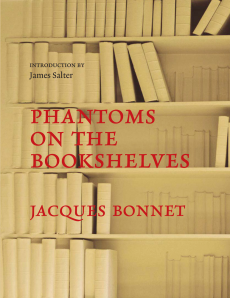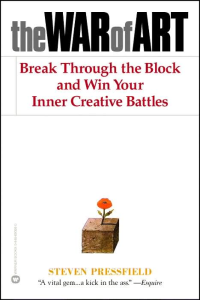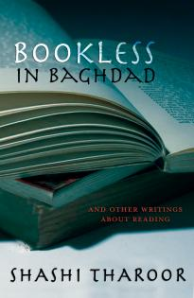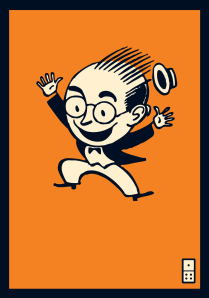Raj Shankar's Blog, page 33
November 17, 2013
Books and Me: Phantoms on the Bookshelves
Book Title: Phantoms on the Bookshelves
I wonder how much we, book lovers will miss if good souls did not translate interesting works from native languages to languages we know. This book ‘Phantoms on the bookshelves’ is one such French work translated into English by Sian Reynolds. Thanks for this kind gesture.
As the book proclaims up front, this is a ‘book about books’. It is for bibliophiles by a bibliophile. The book speaks about the ‘personal library’ and how it reflects the attitude of the collector. The concept of a personal library is slowly reducing in intensity since space is becoming a constraint and so is the time to maintain them. We read books for a variety of reasons. Some may be pure pleasure, sometimes to learn, at times to dream, and many times to forget. Whatever be the reason, books are man’s greatest friend. They support and they scorn distance. They take us to places and introduce us to people who we don’t know.
Many times even people who buy a lot of books feel that it is not a great investment since they are not able to read many of the books. But as the author says, books sometimes are not bought to be read right then, they may come in handy for reference, or like how I picked this book up to read after almost two years of purchase (delayed reading). I bought this book during one of my book buying expeditions. Since I picked a lot of books then, I could not read them. They remained in my personal library till a few days back, when I was wondering what would be a good book to review as part of the National Book Week celebration. I remembered that there were a few books that I had picked long time back on books and decided that this weekend was the best time to go through them.
As is beautifully captured in the words of Alberto Manguel, “The truth is that a library, whatever its size, does not need to have been read cover to cover to serve a useful purpose.” I totally agree. There are times when I have just walked into my personal library and simply felt nice being in the midst of those lovely tomes, small and big, white and yellow, with varying fragrances coming out of them; but they simply relax us. Peace happens.
As one reads the books, it reflects the crazy passion of book lover. It is love without a reason. It is love one way. It is amazing to simply be around them. But all of this is not easy to come by and is also not easy to keep. As the author rightly conveys, it is the book lovers who mostly do with less money than needed to buy the books. It is they who look for cutting corners everywhere else to ensure that books are bought. A lot of people question their rationality, without knowing that man is inherently irrational. But nothing stops the bibliophile from collecting them.
The books are difficult to maintain. With rats, worms, dust and borrowers always trying to move them away from safe zone, it takes a lot of effort from the bibliophile to keep the book to the shelf, safe and sound. I have personally tried many times to make an inventory of my personal library, but have been quite unsuccessful. I know where I have kept certain books, I can remember them like a top end inventory system; but without me it is simply chaos. No one else can locate it. The author talks about the many ways in which people stock their books, by name, genre, and purchase date, amongst others. No one standard here – only personal choices. After all it is a personal library, isn’t it?
With too many options to take man away from books including but not limited to television, mobile phones, social media, communication apps on handhelds, etc, it is difficult to find too many voracious readers. Finding books collectors and people with personal libraries is becoming rare too. The Kindle and other reading apps are also reducing the purchase of physical copies of books. Even though, I am also exploring the Kindle with a few books, there is something magical about a book that is irreplaceable. So, it is not surprising that even after having a Kindle to read, I still end up purchasing physical copies of books, especially ones that have such a fine finish. These good looking ones are sometimes low cost paperbacks – even their finish is attractive.
Love for books must continue. They are man’s best friend – especially because they express themselves one way. They only give and have no expectations from us. They transport us to another world. They give us knowledge, make us imagine, dream and derive immense peace and happiness. There is nothing that can replace the joy of finding the book of a favorite author. The only thing that comes close is reading it and going to bed.
This book is filled with quotes, thoughts, ideas about books from the author (a bibliophile) and also other authors who have written about books. And not to forget, the book, in its little sized, hard cover is beautifully done and is still light enough to carry around to read at a coffee shop or during a travel. Keep a pencil with you when you leave – the notes on the margins will speak to you when you pick the book up many years later! Highly recommended for books lovers and book collectors!
NOTE: 14th to 20th November is celebrated annually in India as the ‘National Book Week’. As part of the celebration I am posting ‘book reviews’ daily. Happy Reading!


November 16, 2013
Books and Me: The War of Art
Book Title: The War of Art – Break Through the Block and Win Your Inner Creative Battles
Steven Pressfield and his work, the War of Art has been a recurring reference across many of my readings in recent times. I gave myself enough reasons to delay its purchase. Something in me kept resisting to pick this book up. So here I am eventually writing a note of me overcoming the resistance to read this book which incidentally is on resistance.
Every individual who engages in any form of art recognizes the importance of acknowledging and overcoming resistance. Many times we don’t even recognize that the force which is not allowing us to create is sitting right within us. Pressfield’s book aptly titled the War of Art bears it all. Inside every artist (veterans included) this battle ensues daily. This battle is actually between the life we are living and the unlived life within us. The first part of the book clearly defines this enemy called resistance in every form possible. As we go through the various definitions of resistance and its manifestations, one is bound to acknowledge experiencing its presence. If we have any doubts after this, a section titled symptoms of resistance quickly makes us sure of it presence.
Resistance is universal. It cannot be done away with. But it can be beaten. It requires a conscious move from being an amateur to becoming a professional. The way Pressfield defines who a professional is seems interesting and demanding. As we move through the book beyond this point, the text slowly but surely leads to some fundamental truths about life and giving. These pages are an extract of the wisdom of the world’s greatest teachers. There are references to Indian scriptures as well as western ones. The importance of owning the right to action and not the results thereof is beautifully captured from a variety of perspectives. There are references to scriptures of the east and west as well as poems and movies that showcase these truths. The author also attempts to differentiate between the ego (philosophically, the little self) and the self. These require not just plain reading but extensive reflection. The author’s detailing of the importance for an artist to find their territory and his description of what a territory means is simply fascinating. Some of the questions in this section are simple and straight, difficult to handle for people without courage. One of the last sentences I made note of before completing the book was this, “Don’t cheat us of your contribution, give us what you’ve got”. Isn’t that a clarion call to live the life we are meant to live?
I read the e-book version and kept wondering how such an interesting book albeit a small one would have been made in print. Sometime in the future when I decide to reread this book, I may prefer to pick a hard copy. While it should be compulsory reading for all who consider themselves artists, it definitely makes good reading for everyone.
NOTE: 14th to 20th November is celebrated annually in India as the ‘National Book Week’. As part of the celebration I am posting ‘book reviews’ daily. Happy Reading!


November 15, 2013
Books and Me: My Journey
Book Title: My Journey – Transforming Dreams into Actions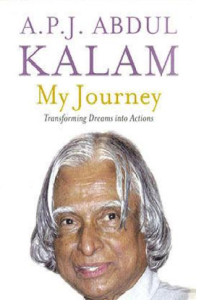
Author: A P J Abdul Kalam
Most of the books written by our former President, Dr. A P J Abdul Kalam are inspiring. They are simple, easy to read and give us a feeling of listening to the author directly. Though many of the books have repetitions of his experiences, one never feels tired or bored of any of his books
I picked this book up as soon as it made its appearance in my local bookstore. I devoured it the same day. The book speaks a lot from the childhood days of the author. It is widely accepted that every person is shaped and influenced during their formative years; the wonderful and at times challenging experiences of Dr. Kalam seems to be no exception. Be it the inter-faith harmony in his home town or the sacrifices made by his mother and sister or the uncontrollable reality of nature’s fury or the positive friendships of his school days, they all seem to have shaped his beliefs and personality. Three specific things stand out as learning for me personally:
Mentors: Finding, having and allowing mentors to shape us is an important aspect for every one of us. Dr. Kalam’s reflection on his mentors, be it Ahmed Jalalludin or Dr. Vikram Sarabhai, highlights this important role. Their importance in his making is strongly emphasized. It is in our own interest that we constantly seek, find and allow mentors to shape us.
Spirituality: Dr. Kalam’s life is filled with experiences and interactions from multiple faiths. Irrespective of the religion, his interest to seek true knowledge and advice has helped him overcome early setbacks. They have strengthened him and enabled him to achieve the much needed balance in life. It is also a reason for his sustained contribution till date.
Reading: As Dr. Kalam rightly states, the importance of reading and books can never be emphasized enough. Right from his early years, Dr. Kalam has been a voracious reader and this love for reading and books seems to continue to this very day. Now that he is also writing many of them, they can be added to our reading list. Dr. Kalam also provides a list of books that influenced him the most.
I must confess that after reading the pre-release excerpt from this book in the Outlook magazine, I was eager to buy a copy specifically to know about Dr. Kalam’s interest in books and reading. As a voracious reader, a bibliophile and a writer, my love for the written word knows no bounds. Since Dr. Kalam has been an inspiring personality that I keep looking up to, I really wanted to know which books he loved the most. That one chapter provided me more value than the price I paid for the entire book. Thanks Dr. Kalam for providing one more inspiring read for the youth of this country.
NOTE: 14th to 20th November is celebrated annually in India as the ‘National Book Week’. As part of the celebration I am posting ‘book reviews’ daily. Happy Reading!


November 14, 2013
Books and Me: Bookless in Baghdad
Book Title: Bookless in Baghdad – And other Writings about Reading
I picked the book up simply because it said it contained essays by a writer on ‘reading’. I love to read and I was quite inquisitive to know what the author meant by calling the book – ‘Bookless in Baghdad’. I must say I enjoyed the book thoroughly for number of reasons. While the essays are all standalone pieces, curated from the author’s earlier writings for various periodicals / newspapers and edited for the volume. This facet of the collection is visible from the number of repetitions of references / experiences across essays. But repetition is a useful aspect of writing, especially when conveying some firmly held beliefs and important points that a reader must definitely receive. I did not find the repetitions too distracting; in fact I read them all happily!
The book is divided into five parts, each containing a selected number of essays. I found the author’s reading of literature quite interesting. Developing reading habits early seems to be a good indicator of potential writing later in life. Shashi Tharoor is not the first writer speaking about voracious reading early in life. The author’s interest in books, reading and writing from early years shows up early in the book. The part titled ‘inspirations’ truly is inspiring. It is inspiring to see what reading can do to a person. It is inspiring to see how we select and fall in love with certain writers, eventually becoming fans and evangelists for their works. The joy of reading, especially the works of authors we love, brings fascination, excitement and imagination. The author’s excessive indulgence and love for Woodehouse and the activities he engages in to spread the love are both interesting and engaging.
Many essays are on books, authors and poets – some popular and some we may not have heard, but whose works have left an indelible impression in the world of literature. The section titled ‘Literary Life’ shares numerous situations that create authors, brings forth their love for writing, and how they sustain their craft. Insights into handling critics and criticisms, what writing can do to you, and how to handle repercussions of writing the truth are beautifully weaved into the writing in a subtle manner. The section titled ‘Appropriations’ was humorous and entertaining. The essay that gave the book its title is another interesting read. The description and detailing creates a sad visual of the people who have always been great readers, now denied access to the world of literature. The street of Al Mutanabi, the books being sold there, the bargains that only a foreigner acknowledges, and the limited availability of textbooks for students (due to lack of major trade) in Baghdad, are both sad and disheartening. ‘Teaching fishing’ instead of ‘providing fish’ has to happen, and for this – books are a great medium. Some of the quotations of the poet whose name adorns the street where the booksellers line up are amazing and give a glimpse of reality. The author’s love for literature, his exposure to international developmental organizations, and his experiences from being in the UN provide a distinct style to the essays. Through his eyes we get to see some places, events, people, authors and books.
Overall it provides an insight into the world of books, literary festivals, book clubs, reading and writing. The book is well made and for light consumption. Anyone, who enjoys the company of books, will come away with numerous insights, discover authors, books and thought triggers.
NOTE: 14th to 20th November is celebrated annually in India as the ‘National Book Week’. As part of the celebration I am posting ‘book reviews’ daily. Happy Reading!


Celebrating National Book Week 2013
Today is Children’s Day! Happy Children’s Day! Not only to the children of today, but also to all the children inside every grown up! If you had spent some time near a school today, you would have realized what joy means. It would have brought back memorable times of simple joys (of your school days) that don’t seem to exist today – at least there doesn’t seem to be time for most of us to think about them. Innocent happiness for no reason but happiness itself! I spent some time listening to the teachers making announcements of events, preachy talks by elders, loud cheering from thousands of students, happy faces in colorful clothes, celebrating together every performance by every student. Oh, what joy?
Today is Pandit Jawaharlal Nehru’s birthday! It is this occasion that is being celebrated as ‘Children’s Day’ across the whole country. The reason why his birthday was chosen as ‘Children’s Day’ is probably because of his great love for children. He always looked up to children as the future of a nation and spent a lot of effort to encourage them, inspire them and motivate them.
Today is also the start of the National Book Week! Happy National Book Week to all who love books! Interesting that today is such an eventful day. On this happy occasion, let’s spend some time with the books and authors we love. Let us spend some time reading a few of the authors or books we cherish. Let us spend some time finding a new book and author to spread the wings of our world of imagination.
India is known for her intellectual curiosity both of the outside world (Tans migratory) and the inner world (Transcendental). Our forefathers have left us with treasure troves of knowledge that can enable us become learned, peaceful and happy people. It is our legacy and we have to safeguard it for our own sake and for the sake of our future generations. Let us make an effort to pick up books of wisdom that connect to us and help spread it to whoever we can. Knowledge has to be shared for it to develop even within us. Go ahead, share and begin it with a small book. I am happy that I still get a chance once in a while to buy books for others. It makes me feel nice sharing them, many times more than even when I get to read them.
As a simple way to celebrate this week of books, I have decided to post one book review every day for the next six days. Normally I post book reviews only every week on Saturday, but this week it will be every day for six days in a row! I hope you will like the reviews and enjoy the books as well. If they are books that you have read and liked, please do share your thoughts and inspirations derived from them as well.
As a voracious reader, a bibliophile and a writer now, books have been my companion for years now. This ‘Book Week’ makes me feel like a Dussehra or Durga Pooja for all of us, book-lovers, who love books and celebrate them. Let share and celebrate the joy of books!
Look forward to a lot of discussions and conversations around books and reading this whole week!

November 12, 2013
Vedantic Wednesday: Nature of Likes and Dislikes
One child says she loves chocolates. The other immediately responds saying she hates them. Why these opposing feelings towards the same object, in this case, a chocolate? Where do these children learn what to like and what to hate? Who taught them these?
Adults teach and children learn. Adults act and children learn deeper and faster. Yes, that’s the truth. Every time a child sees their well wishers do something, it makes an impression on their minds. They learn that this is right or wrong and this creates a deep impression on their minds, which almost never changes. The problem is not in learning that a particular object is good or bad, and should be liked or hated. The problem turns into the bigger learning that we must learn to sort things into two compartments – that which we like and those that we hate. As children grow up, you can see these impressions taking enormous forms even while in school. It is not uncommon for us to hear children say, they like someone and they hate someone; someone is on their friend list and there are a few on the enemy list! Can you imagine small primary school children talking about enemies?
This grows and becomes a permanent feature in almost every adult. They all (including all of us) have likes and dislikes. We have them with foods, clothes, music, books, and more importantly people. This division is simply a figment of imagination. Just like the chocolate in the case of the children we discussed in the beginning, the goodness / badness are both not in the object (chocolate) in their case. Similarly as we grow up, this lack of understanding makes us feel that our likes and dislikes are always in the objects and beings around us. Hence we get affected by the nature and actions of the objects and beings that we come in contact with. Either we are happy that they align to our worldviews and like them or we are unhappy that they are not the way we want them to be, and hence dislike them. This constant stream of likes and dislikes makes us happy and sad alternately. We are not even aware that it is our misunderstanding which is actually causing this constant change in our state of mind. If we even get a doubt, we can reach out to philosophy to help us understand how to start walking out of our problem. If we do, our life becomes more peaceful. Vedanta is one such school of philosophy that explains this ignorance.

November 11, 2013
How to find ‘Your Opportunity’?
Not every opportunity is your opportunity! This is important to accept because once you become opportunity prone, it becomes easy to keep finding them. As a skilled opportunity seeker, one learns to search for fundamental changes and resultant needs and challenges that it throws open.
Change being so fundamental keeps taking place constantly thereby giving rise to opportunities. Being sensitive to change makes one extremely opportunity prone. You suddenly start sensing opportunities just like how you used to get ideas. While one person utilizes the opportunity and creates a flourishing enterprise, thousands of others fail miserably while trying to tap into the same opportunity. This leads me to believe that much before business modelling or planning, it is important for an entrepreneur to find opportunities that connect both personally and professionally.
While it is easy to accept the professional test while choosing an opportunity, many entrepreneurs don’t check for the personal connect. Entrepreneurship is a highly emotional game. Hence it makes tremendous sense to ensure that we work in a domain that not only allows utilization of our competencies, but also is a space that is close to our heart.
One rarely comes across celebrated entrepreneurs who created enterprises across domains. Truly there are exceptions, but let them not define the norm. Hence an inherent aspect or factor of opportunity evaluation must be the entrepreneur’s connect. Find ‘your opportunity’ from among the many opportunities that you will come across before kick starting your venture.

November 10, 2013
Announcements: Demise of Mr Venkat Ramani on 03-Nov-2013
News appeared in The Hindu on 05th Nov’13: http://www.thehindu.com/obituary/05th-november-2013/article5317088.ece
So many people die every day. Why am I writing about this man’s passing away? Because I knew him, I met him, I interacted with him and I had discussions with him; but he is no more there for any of those. This is why I am writing this!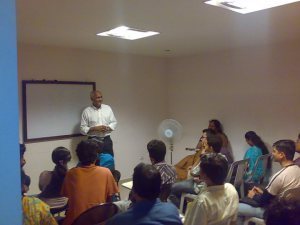
When we started ichiban (my entrepreneurial venture) I met a lot of people, but no one was willing to give me a chance to kick-start my work. Mr Venkat did, not easily, but he did. He was professionally demanding, but when we crossed over his high bar, we saw his kind personal side. We worked with him and his team for years. We learnt a lot from him. We had a common interest as well – philosophy! I met him at Swami Parthasarathy’s Chennai lectures about 18 months ago. His sense of humour is not common. He pulled my leg and we had a good laugh outside the Music Academy hall during the lecture days. We parted that evening hoping to catch up soon, which we did. We met up with some new business proposals once, and then decided to follow up on them, which was never to be. I heard he had taken ill and was not to return to serious work again. He was fighting a tough phase of his life. I left my thoughts about taking on the new opportunity that we had discussed and prayed for his early recovery.
Man proposes, God disposes – isn’t it so true? Heard a few days back that this man who got me started, inspired me by his approach to business was no more! It was a kind of shock even though I had kept myself abreast about his deteriorating health. May his soul rest in peace!
Earlier, when we had started ‘ichiban Academy’ and started running courses for aspiring entrepreneurs, I made it a point to get inspirational speakers into the classroom. In one of our early batches, I invited Mr Venkat to speak. The little classroom was filled to the brim, some even standing on the edges to catch a little glimpse of the talk. He spoke about ‘The Secret’ and how he had applied the law of attraction and positive affirmations in his life to recover from a serious health challenge. His story was moving, inspiring, meaningful, and motivating for the young minds who had gathered to listen. Here was a man who changed the lives of a few that evening! But today he is no more and I wish to share this with all those who listened to him that evening, so that they can say a little prayer for his soul.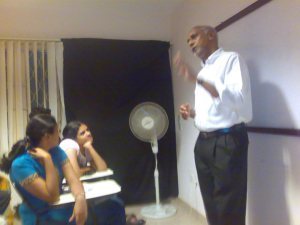
Life gives us opportunities to learn. The divine uses every opportunity to send lessons to us. The vehicle chosen can be anything or anyone – people, objects, experiences, sounds, illusions, visions, etc but the message is delivered. Sadly we have in the course of our busy lives forgotten the way to listen. We ignore these messages of truth, hoping that all that happens around us is not something that will happen to us. This is one of the fundamental errors, all of us commit. This does not mean we become pessimistic with life, but we must take efforts to lead it with greater meaning. Even finding meaning in life does not happen these days! On this occasion, I did not want to miss sharing this message. I am sure a person who used to attend Gita lectures (Mr Venkat) and one who inspired us that evening with his heart warming personal story, would have happily shared this.
Thanks Venkat for inspiring us! We will always remember you and your wishes. I am sure all the students who you inspired will remember you and your message always as well. May your soul rest in peace!


November 9, 2013
Interesting Links This Week: 10-November-2013
Women Entrepreneurs are increasing in number! I am not very surprised on the trend. When one looks at high school results we have more women topping the rank lists than men; we have more passes amongst women than men; and incidentally women are also inherently more matured than men, early. With a lot of support from the ecosystem we should see more success stories amongst women entrepreneurs – but they too have challenges! Here are five that seem important to handle. Read more here – Link: http://mashable.com/2013/10/15/challenges-women-entrepreneurs/
Artists find it difficult to market art! They do their work and most often wait to be discovered and celebrated. As the world gets more connected and geography is literally disappearing, can artists actually get over this difficult part of their trade? Here are 99 ways in which one can market art. Read more here – Link: http://www.inc.com/burt-helm/five-benefits-of-opening-your-books.html
Gartner is a leading voice in technology thought leadership. While the world is seeing enough turbulence one thing that is certain is the increasing influence of technology on every facet of life. Hence it is in everybody’s interest that we keep an eye on the latest technology trends shaping and influencing society at large and business in particular. Here are the Top 10 Strategic Technology Trends for 2014. Very interesting! Read more here – Link: http://www.forbes.com/sites/peterhigh/2013/10/14/gartner-top-10-strategic-technology-trends-for-2014/

November 8, 2013
Books and Me: Poke the Box
Book Title: Poke the box
It is now an open secret that I am a fan of Seth Godin. I read his works for more than the subject under consideration. They provide thought triggers, provocative ideas, inspiring questions and beyond all, provoke me to start doing what I ought to do, but distract myself from. So when I heard about a full book by Seth on provoking one to act, I picked it up instantaneously and devoured it in one sitting.
The book is really short but packed with questions, quotations, imperatives and ‘pokes’. The book makes a clear case to drop all excuses (including reading this book) and get started on our dream project. In typical Seth fashion he raises tough questions which make us stare at the truth head-on. Our responsibility is to give life to our dreams, imaginations and aspirations. The only way we can do justice to them, is to engage in action without falling prey to the inner resistance that distracts us and limits us from even starting.
If you act, results are inevitable. Irrespective of the nature of the results, it is in the spirit and attitude of initiating and sustaining action that makes a life fully lived. What can be more successful than a fully lived life? As it is neatly summarized in a quote from Siddhartha, “There are only two mistakes one can make along the road to truth: (a) not going all the way or (b) not starting.”
Read the book! Poke yourself! Kick-start your project! Overcome resistance! Enjoy and ship your creation!


